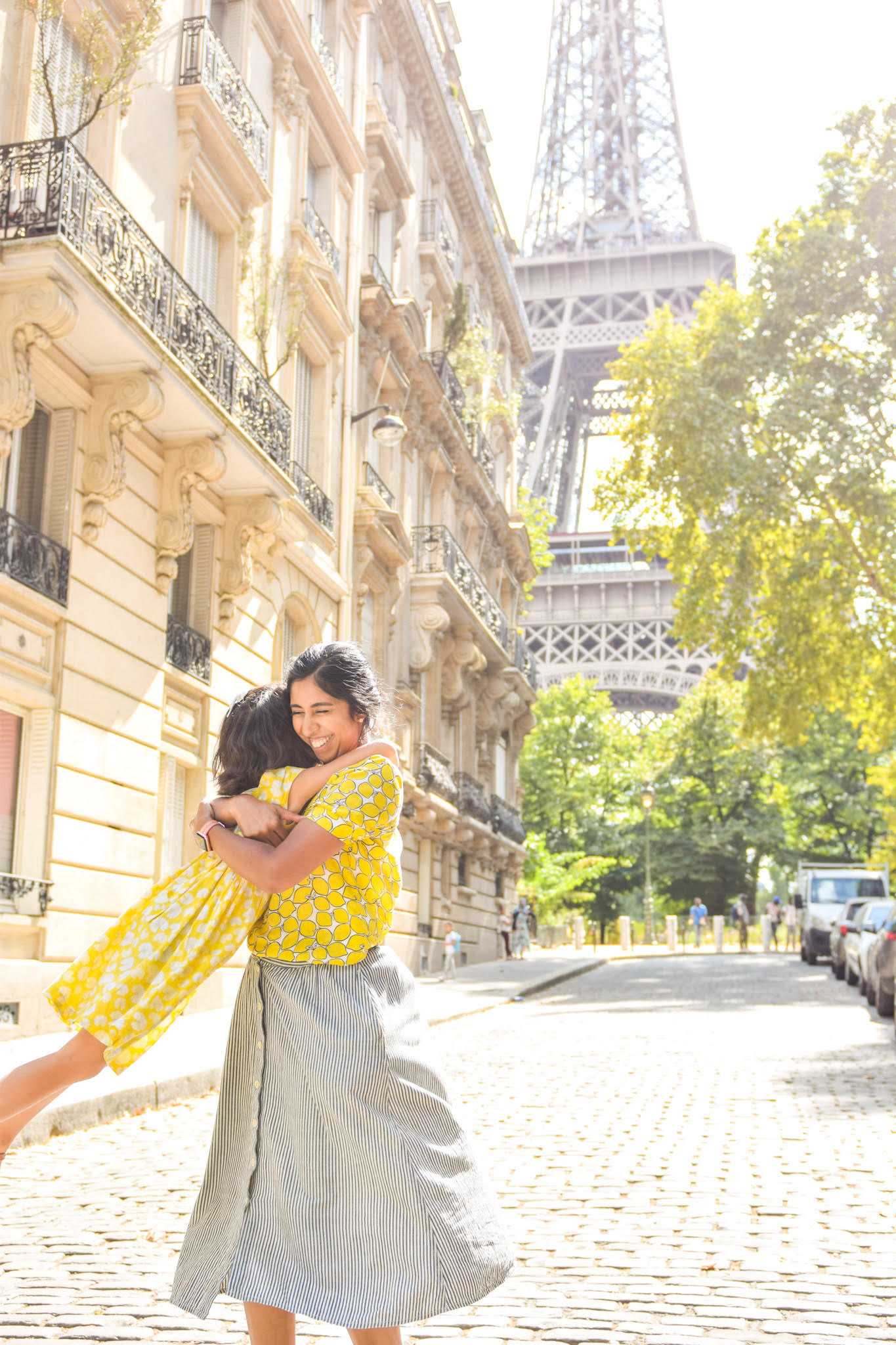Welcome to Lesson #2: Why It’s Important to Connect Kids to the World.
I get asked quite a bit, “What’s the point of traveling with kids or teaching them about different countries if they won’t remember?”
Now that we’ve talked about creating a culture of curiosity in your home, I want you to think about how travel – both real and virtual – can foster that. And remember – that curiosity leads to empathy and compassion, too.
So here’s what I say when I get asked about why we teach our kids about the world and its people.
1. Curiosity
There’s only one forbidden word in our house, and that’s the word “bored.” I believe wholeheartedly that nothing is interesting if you’re not interested (Lionel Shriver), and that everything is interesting if you are. Each of us is responsible for our own interests.
That’s not to say that we all have to be equally fascinated by everything; we don’t. But I DO believe we can appreciate and learn from a huge variety of experiences, and we can train ourselves to be curious about them. Learning about the world does that. It provides jumping off points for imagination and curiosity. Because curiosity is like that idiom about money – the more you have, the more you want, and the more you know, the more you realize you don’t.
Whether gallivanting around the world or snuggling with books on the couch, I hope our kids are always interested – in learning about things, places, and, most importantly, people.
2. It’s Not In Spite of Their Age; It’s Because of It (And They Don’t Need to “Remember”)
Many, many people have asked why we don’t wait to travel until our kids will “remember” the experience. And lots more have told me they can’t virtually travel yet because their kids are “too young.” Guess what – they’re not.
We’ve been traveling with kids since they were tiny not in spite of their age, but because of it. Would you wait to read to your child until they can perfect remember every word of every story? Was all your schooling a waste because you don’t remember every class you ever attended?
Of course not. Because remembrance isn’t just about the words. It isn’t just about the sights and sounds and words. It’s about the experience, and building acceptance and love into their core understanding right from the start. It’s about cultivating compassion and understanding right from the beginning, rather than waiting until they’re already set in their ways.
It’s not just about building minds – it’s about building hearts.
3. Inclusion
One thing about learning about others’ experiences is that you see when people get left out. You hear others’ stories from when they weren’t welcomed. Or if you’re able to actually travel, you may learn first hand what it feels like to be the odd one out. It’s not the best feeling.
I hope my kids remember what it’s like to be different, and to support others that may feel that way. I hope they remember to include. I hope their excitement to learn about others translates into making way for bonds of friendship.
I hope they always remember to be interested in others. Is it awesome when my oldest could say he’d visited 43 countries by the time he was 9? Sure. But is it 1000x more awesome when my kid is anxious to welcome in and befriend a new child with Italian heritage at school because he loved learning about the Colosseum? You betcha.
4. Compassion & Love
Going hand in hand with inclusion is compassion. I once heard the phrase, “It’s hard to hate up close.” When we get to know people and their experiences, we almost inevitably come to understand them and feel compassion for them. Whether we’re traveling around the world or just learning about others around the world through books and videos, I want my kids to have that opportunity for compassion.
When someone becomes familiar to us, either in person or through story, it’s difficult to hate. Instead, we gain acceptance and love.
5. Adaptability & Flexibility
When traveling with kids – whether across the world or across the city or learning from home – something is bound to go wrong with even the best-laid plans. That’s just life with kids! It took me a while to realize that’s actually a good thing.
Why could that possibly be good? Well, I tend to be a pretty Type A, organized planner. I like The Plan. The Plan give me comfort. And when things change? It sometimes feels like the world may end.
But then it doesn’t. The world goes on, usually just fine, and often better than before. I’d rather my kids learn that lesson a lot sooner than I did. Travel – whether virtual or actual – teaches flexibility and adaptability. Perhaps we don’t have the exact right ingredients – we can still cook. Maybe one museum is closed – we can try another.
Be adaptable. Be flexible. Embrace the change.
6. Openness and Confidence with New People & Experiences + Love of Diversity
We all tend to like being in our own comfort zones. Sometimes, it’s a bit of a stretch to try a new food or read a book about a character different from yourself. We all appreciate familiarity! But sometimes the biggest rewards are when we learn about a new structure or treat or person. Traveling with kids – even when just doing it from home – is one of the best ways we found to provide lots of opportunities for reaching beyond those comfort zones.
This lessening of stranger danger or fear of the unknown is something I hope sticks with them, even if they don’t remember the specific people or experiences. Research indicates that even in first six months of life, we can help lessen bias by exposing babies to different types of people and lifestyles. They look to their parents for their reactions, which gives them an opportunity to see reactions to different circumstances and people. They’re learning, even when they’re tiny.
I hope they remember to be open to new opportunities, people, and experiences, and to share things they learn from them. As one reader wrote, “We value giving our kids diverse experiences, surrounding them with diverse cultures, exposing them to diverse ideas.”
7. A Wide Variety of What is Familiar
Though I want my kids to appreciate the new and the different, and to be okay going beyond comfort zones, we all still have a tendency to gravitate to the familiar.
We love what is normal and familiar to us. Have you heard of food neophobia? Better known as picky eating, it’s a common phenomenon that causes young children to reject new foods and flavors. They often need 8-10 experiences with the food before they like them. And what’s interesting is that the more comfortable kids get with new foods in general, the less time they take to start to like other new foods.
The same is true for other experiences, as well – including people. The more experiences our kids have with other people and cultures and backgrounds, the more they like them. And when they use their good curiosity and subsequent liking to channel empathy and appreciation, the more willing they are to learn about and like other new people and backgrounds.
That toolbox of familiarity allows us to connect with a whole bunch of other people, based on similar interests or knowledge or understanding of background. I want my kids to have a hugely diverse learning to assist them in connecting with a hugely diverse set of people.
8. Being Different
Speaking of leaving comfort zones, I hope my kids remember what it’s like to be different. I hope they remember the discomfort. I hope they know what it is to be the outsider, and to be on the fringe. I hope they remember what it’s like to not always understand the joke or to not know which way to go. I hope they remember the fear of being different, and of being left out.
I hope they remember stories of people who didn’t fit in, and who didn’t fit the mold. I hope they see people and sit with them in their difference.
And I hope that remembrance spurs them to do everything in their power to support and love any other person who may feel the same.
9. Noticing and Appreciating Differences
For all that being different, though, I hope they learn to not fear it. I hope they find joy and delight in learning about uniqueness in history and music and sports. I hope they notice and appreciate it.
10. Open Palates
Food is definitely one of our favorite ways to experience a culture, whether we’re traveling with kids or at home. I love how trying a variety of foods expands my kids’ palates, and helps them experience a wide variety of flavors. They don’t have to like it all, but I hope they find seeds of connection from the food to the lifestyles, histories, and peoples of the places we study.
11. Focused Family Time
Our everyday has so many distractions. It’s filled with them. Having a specific purpose helps us overcome that. Sometimes that purpose is actual travel, where we rely on each other and work together. Sometimes it’s just a project to learn about travel, plan for it, or immerse ourselves in another world right from our home.
Either way, it provides us focus and direction. It provides opportunities and also content for conversation. It’s a gift for our family, and I hope they remember those moments and memories we create, or at least the feeling of them.
12. Language Development
You know what’s really great for language development? Books and learning second languages. While kids who learn phrases in multiple languages early may sometimes mix them up, it also creates neural pathways that support later cognitive and language development.
Plus, when they have people to talk to, or inspiration for what to talk ABOUT through books, movies, and other activities focused on global education, it sparks communication. Kids talk when they have exciting things to talk about, and interesting people to talk to.
13. Ability to Troubleshoot to Troubleshoot
It’s so easy to see a problem and think, I can’t do anything about that. It’s out of my control. Travel as well as learning about innovations and people in other cultures teaches us and our kids to troubleshoot and problem solve in unique ways. So the subway is down? Which bus line would get us there? Perhaps we wanted some green paint for the grass near the Taj Mahal but we don’t have any – maybe we can mix blue and yellow instead.
I love how opening up other experiences and opportunities gives our kids a chance to take the lead on figuring out an innovative solution. It lets them practice exercising those troubleshooting muscles.
14. Excitement + Fun
All the learning and lessons and socio-emotional lessons are great. You know what’s also great? FUN. Traveling with kids around the world and learning about other cultures, foods, and places is just fun. Kids are delighted about stories from around the world ranging from Greek mythology to Hindu morality tales.
I hope my kids can have fun with it, and that we can make wonderful family memories through those travels, real and virtual. And you know what? It’s not just fun for them. It’s fun for me, too. In a culture that sometimes ignores the needs of the mom, that’s important.
15. Empathy
Everyone has a story. And no story is the same. When traveling with kids, either through virtual travel or real-life travel, we get to be witnesses to those stories. And by hearing and seeing those other stories, we can imagine ourselves in them. We can think of what it would be like to be in that situation, with those circumstances, and with that background.
It it this, perhaps more than anything else, that I hope my children learn from the world.
It’s built into the fabric of their character. They may not remember specific experiences and lessons. But those experiences, like the millions of board books read before a child can even talk, make up who they are.
It’s not always easy to reach outside of yourself and put yourself in someone else’s shoes, but it is always, always worth it.
I hope it’s worth it for you, too.
I’ll see you back here tomorrow for Lesson #3!



